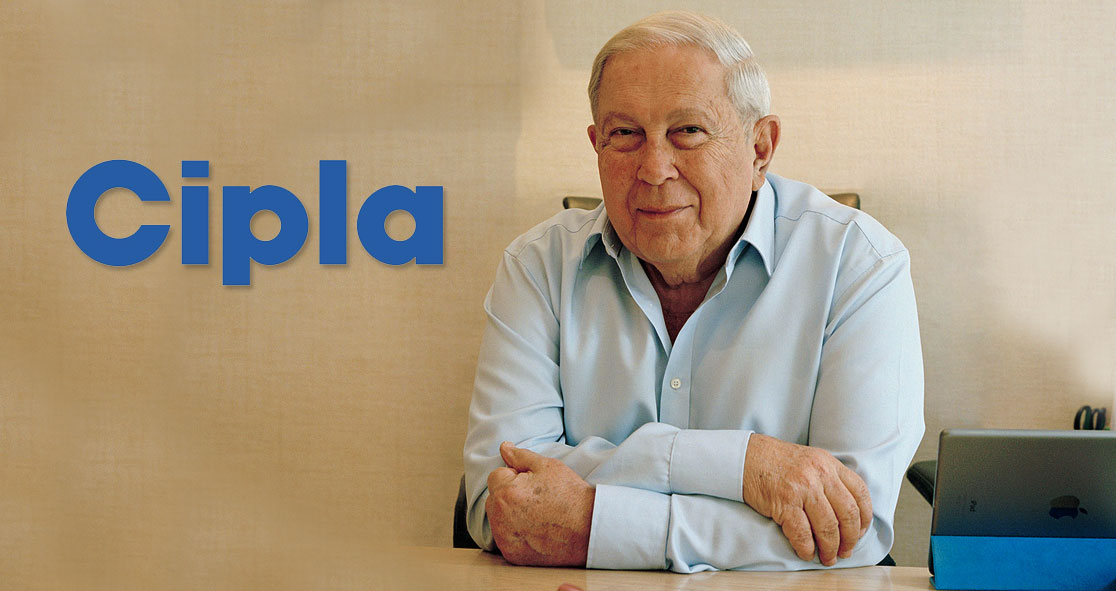Dr. Yusuf Hamied, the chairperson of Cipla, one of India’s multinational generic pharmaceuticals companies, played a key role in developing an affordable generic drug for patients with HIV (human immunodeficiency virus), according to Scroll, an Indian news outlet.
He became prominent for defying large Western pharmaceutical companies in order to offer generic HIV/AIDS drugs and treatments for poor people in developing countries.
In 2005, Dr. Hamied received the Padma Bhushan from the Indian government. In 2012, he was awarded “CNN-IBN Indian of the Year” in the category of business.
In April 2013, Tarun Khanna, Scroll writer, interviewed Dr. Hamied about his role in developing a cheaper generic drug for HIV.
In that interview, Dr. Hamied was asked to talk about a combination of azidothymidine (AZT) and a cocktail of drugs for HIV, and an antiviral for the avian flu.
He said, “First, there was this intellectual property (IP) thing in 1995, and we did really well. In 1991, we were working very closely with the laboratories of the Council of Scientific and Industrial Research.”
Dr. Hamied recalled, “My friend at the National Chemical Laboratory was a gentleman called Dr. Rama Rao; he assisted us with the development of many raw materials. He is still very active today, even at the age of 78, and I am still in touch with him.”
“One day in 1991, Rama Rao came to me and said, ‘Yusuf, I’ve developed a synthesis for AZT, zidovudine, and the government has allowed me to collect the starting material to make it, beta thymidine, which can be imported without duty in India. And this drug is for AIDS.’”
In 1991, people did not know how dangerous the AIDS epidemic was.
In 1993, Dr. Hamied and his team made AZT. In India, the drug was priced at $2 per day, while the international price at that time was $12 per day.
However, in the same year, they ran out of money for the treatment; they only had money to detect and prevent HIV, prompting them to shut down the manufacturing of the drug.
In 1996-97, Dr. Hamied came across an article in the medical journal called HAART (Highly Active Antiretroviral Therapy), which mentioned that a combination of three drugs controlled HIV infection.
By the year 2000, he and his team could get all the three ingredients for the cocktail.
He was invited to speak at the European Union in September 2000.
He said three things. First, “we are making a cocktail of drugs, and we will give it at $800 (Rs. 36,500 in 2000) per patient per year, as opposed to $12,000 (Rs. 5.5 lakh) per year.” Second, “Cipla will give technical know-how to any government of a developing country that wishes to produce its own HIV drugs.” Third, “we will give the drug that stops the transmission of HIV from mother to child totally free.”
Dr. Hamied wanted a humanitarian approach. Instead of giving drugs freely, “we will give it selectively.” Therefore, they approached Médecins Sans Frontières (MSF), a.k.a. Doctors Without Borders. In 2001, MSF was the biggest and the best NGO for HIV/AIDS.
In February 2001, they wrote to MSF and offered them the cocktail drugs for HIV, with a dosage of two tablets a day, morning and night, at $350. He said, “We had sent them a fax but there was no response to it.”
However, he was approached by Donald McNeil, a health reporter of The New York Times. McNeil interviewed Dr. Hamied and asked about the offer they made to MSF. After asking a few questions, McNeil said, “Dr. Hamied, your life will not be the same after tomorrow.”
On February 7, 2001, an article was published on the front page of The New York Times, titled, “Indian Company Offers AIDS Cocktail at a Dollar a Day.” Eventually, the offer was taken up.
However, new drug combinations have come up and the processes have improved.
A few years ago, India produced, 92% of all the HIV drugs in the world.
Today, Gilead Sciences, an American pharmaceutical company, is dominating the global HIV drug market. The California-based company manufactures HIV drugs such as:
- Atripla (efavirenz/emtricitabine/tenofovir disoproxil fumarate)
- Biktarvy (bictegravir/emtricitabine/tenofovir alafenamide)
- Complera (emtricitabine/rilpivirine /tenofovir disoproxil fumarate)
- Descovy (emtricitabine/tenofovir alafenamide)
- Emtriva (emtricitabine)
- Genvoya (elvitegravir/cobicistat/emtricitabine/tenofovir alafenamide)
- Odefsey (emtricitabine/rilpivirine/tenofovir alafenamide)
- Stribild (elvitegravir/cobicistat/emtricitabine/tenofovir disoproxil fumarate)
- Truvada (emtricitabine/tenofovir disoproxil fumarate)
- Tybost (cobicistat)
- Viread (tenofovir disoproxil fumarate)
Dr. Hamied indeed played an important role in the battle for mass antiretroviral treatment in Africa, which is portrayed in a 2013 documentary film called “Fire in the Blood.”
In the film’s review, India Today noted that “the story of Yusuf Hamied will make every Indian proud as he was the only man who decided to walk against the tide and sell drugs to save lives without focusing on profits.”
In February 2013, Dr. Hamied announced his retirement plans from Cipla. He was the managing director of the company for more than 50 years. In the same year, Forbes included him in its list of richest Indians.
Dr. Hamied once said, “I don’t want to make money off these diseases which cause the whole fabric of society to crumble.”
For detailed information and statements on what Dr. Hamied told Khanna, check the article titled “How Yusuf Hamied’s Cipla Developed an Affordable Generic Medicine for AIDS,” published on Scroll. The article is an excerpt taken from ‘Leadership To Last: How Great Leaders Leave Legacies Behind,’ a book by Geoffrey Jones and Tarun Khanna.





















